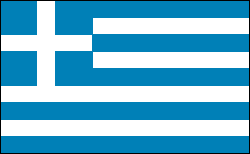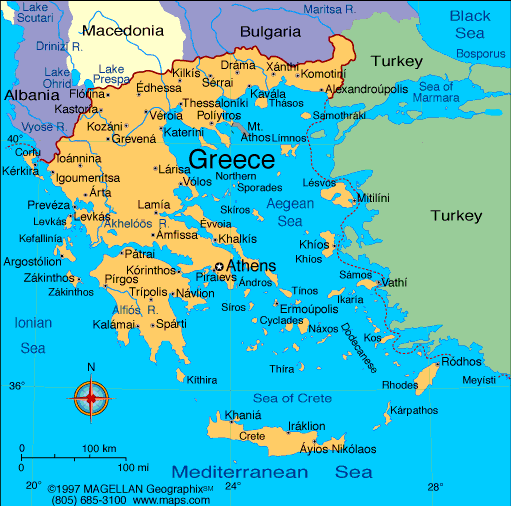GREECE

Geography: Located in southern Europe, Greece forms an irregular-shaped peninsula in the Mediterranean with two additional large peninsulas projecting from it: the Chalcidice and the Peloponnese. The Greek islands are generally subdivided into two groups, according to location: the Ionian islands (including Corfu, Cephalonia, and Leucas) west of the mainland and the Aegean islands (including Euboea, Samos, Chios, Lesbos, and Crete) to the east and south. North-central Greece, Epirus, and western Macedonia are all mountainous. The main chain of the Pindus Mountains extends from northwest Greece to the Peloponnese. Mount Olympus, rising to 9,570 ft (2,909 m), is the highest point in the country.
Government: Parliamentary republic.
History: Indo-European peoples, including the Mycenaeans, began entering Greece about 2000 B.C. and set up sophisticated civilizations. About 1200 B.C. , the Dorians, another Indo-European people, invaded Greece, and a dark age followed, known mostly through the Homeric epics. At the end of this time, classical Greece began to emerge (c. 750 B.C. ) as a loose composite of city-states with a heavy involvement in maritime trade and a devotion to art, literature, politics, and philosophy. Greece reached the peak of its glory in the 5th century B.C. , but the Peloponnesian War (431–404 B.C. ) weakened the nation, and it was conquered by Philip II and his son Alexander the Great of Macedonia, who considered themselves Greek. By the middle of the 2nd century B.C. , Greece had declined to the status of a Roman province. It remained within the eastern Roman Empire until Constantinople fell to the Crusaders in 1204. In 1453, the Turks took Constantinople and by 1460, Greece was a province in the Ottoman Empire. The Greek war of independence began in 1821, and by 1827 Greece won independence with sovereignty guaranteed by Britain, France, and Russia.
The protecting powers chose Prince Otto of Bavaria as the first king of modern Greece in 1832 to reign over an area only slightly larger than the Peloponnese peninsula. Chiefly under the next king, George I, chosen by the protecting powers in 1863, Greece acquired much of its present territory. During his 57-year reign, a period in which he encouraged parliamentary democracy, Thessaly, Epirus, Macedonia, Crete, and most of the Aegean islands were added from the disintegrating Turkish empire. Unfavorable economic conditions forced about one-sixth of the entire Greek population to emigrate (mostly to the U.S.) in the late 19th and early 20th centuries. An unsuccessful war against Turkey after World War I brought down the monarchy, which was replaced by a republic in 1923.

Map of Greece
President: Prokopis Pavlopoulos (2015)
Prime Minister: Alexis Tsipras (2015)
Land area: 50,502 sq mi (130,800 sq km);
total area: 50,942 sq mi (131,940 sq km)
Population (2014 est.): 10,775,557 (growth
rate: .01%); birth rate: 8.8/1000; infant mortality rate: 11/1000;
life expectancy: 80.3
Capital (2011 est.):
Athens, 3.414 million
Other large cities:
Thessaloníki, 883,000
Monetary unit: Euro (formerly drachma)
National
name: Elliniki Dimokratia
Languages:
Greek 99% (official), English, French
Ethnicity/race:
Greek 93%, other 7%; note: numbers represent citizenship, since Greece does not collect data on ethnicity
Religions:
Greek Orthodox 98%, Islam 1.3%, other .7%
Literacy rate: 97.3% (2011 est.)
Economic summary: GDP/PPP (2013) est.):
$267.1 billion; per capita $23,600. Real growth rate: –3.8%.
Inflation: -0.8%. Unemployment: 27.9%. Arable land: 18.95%. Agriculture: wheat, corn, barley, sugar beets, olives,
tomatoes, wine, tobacco, potatoes; beef, dairy products. Labor
force: 4.918 million; agriculture 12.4%, industry 22.4%, services 65.1%
(2005 est.). Industries: tourism, food and tobacco processing,
textiles, chemicals, metal products; mining, petroleum. Natural
resources: lignite, petroleum, iron ore, bauxite, lead, zinc,
nickel, magnesite, marble, salt, hydropower potential. Exports:
$30.39 billion (2013 est.): food and beverages,
manufactured goods, petroleum products, chemicals, textiles.
Imports: $50.58 billion (2013 est.): machinery, transport
equipment, fuels, chemicals. Major trading partners: Germany,
Italy, China, Bulgaria, Turkey, France, Netherlands,
Russia, Iraq (2013).
Communications: Telephones: main lines in
use: 5.461 million (2012); mobile cellular: 13.354 million (2012).
Broadcast media: Broadcast media dominated by
the private sector; roughly 150 private TV channels, about ten of which
broadcast nation-wide; 1 government owned terrestrial TV channel with
national coverage; 3 privately owned satellite channels; multi-channel
satellite and cable TV services available; upwards of 1,500 radio
stations, all of them privately owned; government owned broadcaster has 2
national radio stations (2014). Internet hosts: 3.201 million (2012).
Internet users: 4.971 million (2009).
Transportation: Railways: total: 2,548 km
(2009). Highways: total: 116,960 km (including 1,091 km of expressways); unpaved: 75,603 km (2010).
Waterways: 6 km; note: Corinth Canal (6 km) crosses the Isthmus
of Corinth; shortens sea voyage by 325 km (2012). Ports and
harbors: Agioitheodoroi, Aspropyrgos, Pachi, Piraeus,
Thessaloniki. Airports: 77 (2013).
International disputes:
Greece and Turkey
continue discussions to resolve their complex maritime, air,
territorial, and boundary disputes in the Aegean Sea; Cyprus
question
with Turkey; Greece rejects the use of the name Macedonia or
Republic
of Macedonia; the mass migration of unemployed Albanians still
remains a problem for developed countries, chiefly Greece and Italy.
-------------------- o --------------------
No comments:
Post a Comment